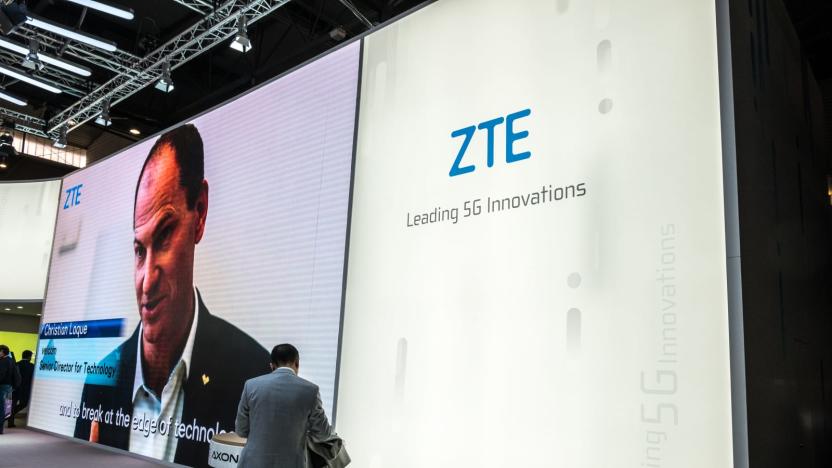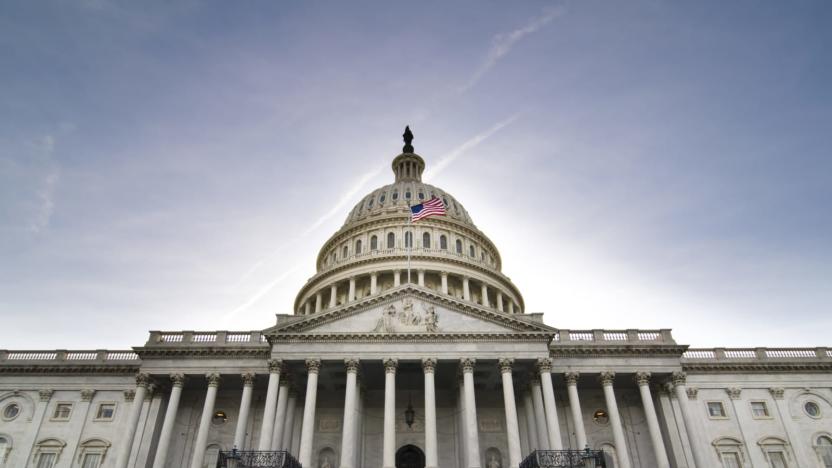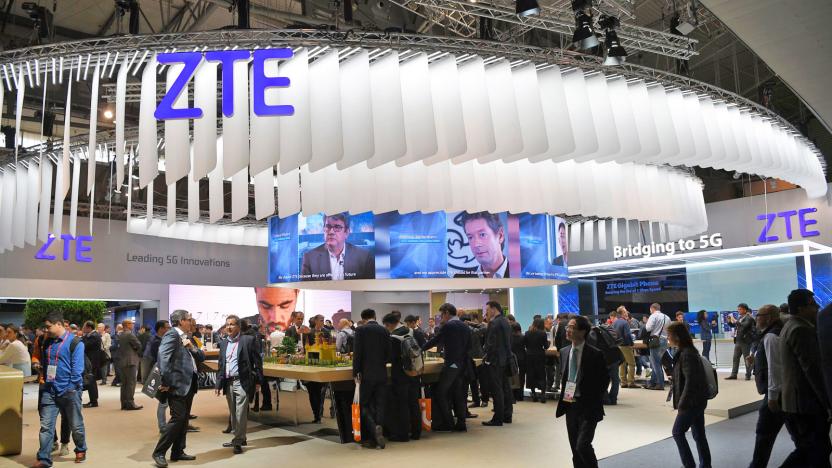departmentofcommerce
Latest

Trump administration suggests firmer controls on data privacy
The National Telecommunications and Information Administration (NTIA) has laid out the Trump administration's approach to bolstering data privacy. The agency is seeking to strike a balance between increased consumer protection and affording companies room to innovate with its proposals, which could lead to a US version of the EU General Data Protection Regulation (better known as GDPR).

US lifts ZTE export ban
ZTE has another chance at redemption. The US Commerce Department has lifted the export ban on the Chinese mobile giant now that it has met all the terms required to get a full reprieve. Officials confirmed that ZTE had put $400 million in escrow on top of other requirements, including the payment of a $1 billion fine, replacing key leadership and accepting outside monitors that will ensure it honors US export controls.

US and Chinese presidents work to get ZTE 'back into business'
ZTE's future is currently grim in light of the revived US export ban, but is it guaranteed to wither and die? Not necessarily. President Trump has tweeted that he and Chinese President Xi Jinping are "working together" to give ZTE a "way to get back into business." Just how that would happen wasn't clear, but he told the US Commerce Department to "get it done."

ZTE faces revived US export ban over false statements
When the US Commerce Department slapped ZTE with $1.19 billion in penalties for illegally shipping telecom gear to Iran and North Korea (and making false claims about it), it offered a reprieve: it would suspend a seven-year export ban as long as the Chinese company honored an agreement and didn't break the rules again. Apparently, ZTE might have blown its chance at a break. Department officials have revived an order banning ZTE from exporting US products after accusing the company of lying about punishing those involved in the scandal.

Bipartisan bill calls for study on economic impact of broadband access
Two Democratic and two Republican Representatives have introduced a bill that, if enacted, would require the Department of Commerce to research how access to broadband impacts a variety of economic factors like employment, income and population growth, Wired reports. The proposed legislation, called Measuring the Economic Impact of Broadband Act of 2017, was introduced by Representatives Ro Khanna, Brian Fitzpatrick, Anna Eshoo and Ryan Costello and is a companion bill to a bipartisan Senate proposal led by Senators Amy Klobuchar and Shelley Moore Capito.

ZTE will pay $1.19 billion for violating US trade sanctions
ZTE is still feeling the pain from its alleged violation of US trade sanctions against Iran and North Korea. The Chinese tech giant has reached an agreement with the Commerce Department to both plead guilty to violation charges and pay a total of $1.19 billion ($892 million in the Iran case) as a penalty. That's a stiff cost, but ZTE didn't have much choice. The US' sanctions against the company, suspended while the two sides negotiated a deal, would have crippled its business by largely denying access to crucial American parts like Qualcomm's mobile processors.

White House initiative pushes for more tiny satellites
Miniature satellites are increasingly a big deal, and for good reasons: they're not only less expensive and easier to deploy than the giant satellites of old, but can cover wider areas. And the White House wants to give them a helping hand. It's launching an initiative that will foster small satellites with the resources they need to flourish. To start, NASA is not only proposing as much as $30 million toward purchasing data from these tiny vessels, but creating a Small Spacecraft Virtual Institute that will offer know-how to organizations. A more direct effort has the National Geospatial-Intelligence Agency awarding Planet a $20 million contract for a fleet of small satellites that can capture images of "at least" 85 percent of the planet every 15 days.

US reduces its internet oversight
After lengthy delays and no small amount of political opposition, it's official: the US has given up a key aspect of internet oversight. As of October 1st, the Internet Corporation for Assigned Names and Numbers (the outfit that manages the domain name system) is no longer under the watch of the US' National Telecommunications and Information Administration. ICANN is now a private, non-profit organization that will take its input from academics, companies, governments and the public. While the American government didn't really wield its influence, it no longer has that option.

US renews five-year gaming education grant for Becker College
To maintain its interest in gaming education, the US Department of Commerce's Economic Development Administration renewed a five-year grant this week with Becker College in Worcester, Massachusetts. Becker College is the home of MassDigi, an academic program that focuses on the entrepreneurial side of game development, including a 12-week summer program where attendees take a concept to a market ready title. The Economic Development Administration's grant is for the amount of $583,000.

Data breaches and spying fears are keeping people offline
Have countless data breaches and unfettered government surveillance left you nervous about doing things online? You're definitely not alone. The US National Telecommunications and Information Administration has conducted a survey revealing that nearly half of the Americans it surveyed (41,000 homes) have scaled back their internet activity over privacy and security fears. About 29 percent have avoided online finances, while 26 percent skipped online shopping. A similar amount decided against posting on social networks, and 19 percent even decided against offering "controversial" opinions online.

ZTE faces restrictions on using US technology
Chinese companies already have a hard time doing business with the US (mostly over spying fears), and it's about to get worse. Reuters sources understand that the US Commerce Department is about to slap ZTE with restrictions on what it's allowed to import from its American suppliers. From March 8th onward, those companies will reportedly need to apply for export licenses to ship anything to ZTE, and those grants will "generally be denied." The move would be punishment for allegedly breaking export rules by shipping US tech to Iran.

Commerce Department gets its first ever Chief Data Scientist
Want proof that US officials are taking data seriously? Just look at the Commerce Department. It's following in the White House's footsteps by hiring its first ever Chief Data Scientist, Jeff Chen. He'll make sure that the department is making the most of data across the many, many fields it covers: he could improve predictions for severe weather, for example, or help modernize the US' creaky patent system. Chen certainly has the experience to back it up, having worked with everyone from NASA to the White House's own Office of Science and Technology Policy. There's only so much he can do in the new role, but it won't be surprising if he gets the wheels of government turning considerably faster. [Image credit: Getty Images]

The US won't end its internet oversight for another year
If you were looking forward to the US relinquishing its internet oversight at the end of September... well, you'll be disappointed. The Department of Commerce has delayed the transition by "at least" a year. Simply put, the community isn't yet ready to take the reins -- it won't have time to both submit and implement its plans, which need a government rubber stamp to go ahead. The breathing room should give ICANN and friends a smoother transition that keeps the internet's domain name system out of the hands of governments and other parties that might want to limit free speech or privacy. There's no certainty that this is the last delay, but the Commerce Department can extend its ICANN partnership for up to three more years if there's a particularly serious logjam.

US to reduce its oversight of a key internet governor, but don't expect big changes
The US government has been gradually reducing its influence over the internet ever since it offloaded domain management responsibilities to ICANN back in the late 1990s, and today it took an important (if mostly symbolic) step toward severing those connections for good. The Department of Commerce has asked ICANN to work on a transition plan that will end American monitoring of the firm, letting it run independently. The only major stipulations are that the resulting system is free of government control, maintains cooperative governance and fosters an open internet. The transition was always going to be in the cards at some point, but the proposal request is a gesture toward an international community worried that a surveillance-happy US has too much say over what happens online. Don't be too quick to celebrate, though. A big policy change is unlikely, at least in the short term -- the Commerce Department has only had limited practical control. Also, ICANN itself only has so much reach. While it does watch over domain names and network addresses, it can't completely block sites or open them up to spies. At the moment, the shift is more about fulfilling promises and reassuring global partners than anything else.

Internet infrastructure groups push for more independence from US monitoring
Internet overseers like ICANN, the IETF and the W3C aren't happy that the US strongly influences their operations, especially when it likes to spy on much of the world. Accordingly, several of these organizations have just called for truly international governance of online affairs. The groups want to speed up the globalization of their roles and let everyone contribute "on an equal footing." In other words, they want national institutions like the US Department of Commerce (which monitors ICANN) out of the picture. A statement of intent doesn't guarantee action, but it's clear that Americans shouldn't expect to maintain their current level of control.

Department of Commerce renews VeriSign control of .com registry, demands price freeze
In many ways, VeriSign has been one of the internet's true arbiters. It's ICANN's official registry operator for .com domains, which lets it determine how (and how much) we pay to get a particularly coveted address. As we're learning, the US Department of Commerce is only comfortable with that state of affairs to a certain point. It just approved a deal renewal that will let VeriSign watch over .com between December 1st this year and November 30th, 2018, but it's requiring that the company drop a previous right to hike registration prices as many as four times, at up to 7 percent, over the length of the term. The current $7.85 price will last unless VeriSign either faces exceptional circumstances or can prove that the market is healthy enough to lift the ceiling. We're sure the business isn't happy when the DOC move dictates how much money it can make, but compulsive domain hunters will enjoy the extra dollars in their pockets.

Americans to get DTV coupons before analog gets the kibosh
In 2009, we'll all say our final farewells (good riddances) to sub-par analog television. Despite congressional apprehension, the Department of Commerce has gone forward with a plan to ease old-hat Americans into the digital TV age. Our source article's coughed up some wacky numbers, so we can't really tell whether the budget will suffice or not. Any household will be allowed to claim two $40 coupons each for a discount on digi-to-analog set-top boxes until nearly $1 billion has been spent. If old-hat peeps are still left hanging, another $500,000 ($500 million?) will be available only to those depending on antennas for reception. Apparently only 15% of the current 73 million analog TV users are catching their TV via antenna, so they shouldn't have much trouble scoring the discount at least. The National Telecommunications and Information Administration's plan alots for a max amount of about 33,750 (37.5 million?) coupons -- hopefully enough to keep everyone glued to the tube. In the case of a shortage, one idea is to sit tight and hope enough people opt out of the coupons and volunteer to throw down for a new TV that supports digital broadcasting. Another is for the government to increase the subsidy -- a measure the Democrats already tried to push for with no success. Either way, we're talking about a historic shift in the way we watch television in America, people -- it's sure to be rat possum race and if you snooze 'til February 19, 2009, you'll royally lose.[Thanks to everyone who sent this in]



